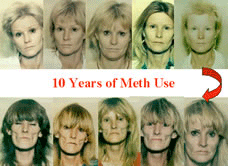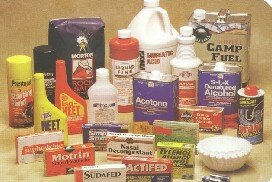What is Meth? | How Meth Watch Works | Meth Watch Materials
For Retailers | Partners | Training | Mini-Grant | Video
What is Meth?
 Methamphetamine, also known as “meth,” “speed,” “crank,” or “ice,” is a very powerful and highly addictive stimulant that affects the central nervous system. Meth is a synthetic drug produced or sold as pills, capsules, or powder that can be smoked, snorted, injected, or swallowed.
Methamphetamine, also known as “meth,” “speed,” “crank,” or “ice,” is a very powerful and highly addictive stimulant that affects the central nervous system. Meth is a synthetic drug produced or sold as pills, capsules, or powder that can be smoked, snorted, injected, or swallowed.
Methamphetamine is a neurotoxin, meaning it damages the nervous system. Meth use can cause dependence and addiction psychosis, stroke, dangerously high body temperature, and cardiac arrhythmia. Withdrawal often results in severe depression and paranoia.
Meth is both imported and manufactured locally.
For many years, meth primarily has been imported into the United States as a finished drug from Mexico, and more recently from other countries as well, including Canada, China, and Southeast Asia. In addition, it also has been made locally, principally from bulk quantities of chemicals illegally smuggled into this country. These bulk chemicals—most notably pseudoephedrine and ephedrine—are used by “super labs,” defined as laboratories capable of making more than 10 pounds of methamphetamine in 24 hours. According to the U.S. Drug Enforcement Administration, these large-capacity facilities produce most of the methamphetamine made in this country.
However, the production of methamphetamine has changed significantly during the past 10 years. Law enforcement authorities have seen a substantial increase in the number of small labs where meth cooks use “recipes,” often found online, to create small amounts of the drug from legitimate household products. While these small homemade labs produce a tiny fraction of the meth a “super lab” may produce, they present a huge danger to the communities in which they operate. Toxic, hazardous, and explosive chemicals are by-products of the production process, and have a devastating effect on the environment, communities, and the children who are often present. Because of the hazards they produce, these types of labs are called “small toxic labs” by law enforcement officials.
Meth can be made from commonly available, legitimate household products.
 The spread of meth across the country has been a difficult problem for law enforcement. These small toxic labs can be found in a meth "cook's” home, in an automobile, or alongside a road. The ingredients used to make meth are legitimate household materials, usually found at retail stores, such as:
The spread of meth across the country has been a difficult problem for law enforcement. These small toxic labs can be found in a meth "cook's” home, in an automobile, or alongside a road. The ingredients used to make meth are legitimate household materials, usually found at retail stores, such as:
- Over-the-counter cough, cold, asthma, and allergy medicines containing pseudoephedrine or ephedrine
- Acetone
- Rubbing and isopropyl alcohol
- Iodine
- Starter fluid (ether)
- Gas additives (methanol)
- Drain cleaner (sulfuric acid)
- Lithium batteries
- Rock salt
- Matchbooks (red phosphorus)
- Lye
- Paint thinner
- Aluminum foil
- Glassware
- Coffee filters
- Propane tanks
Given the requirements of the meth production process, many communities across the nation are forming partnerships between law enforcement and retailers to fight this problem. Retailers are in a unique position to help law enforcement in the fight against meth since the small-scale labs use a number of commonly found household products available at drugstores, supermarkets, and other retail outlets found in every community. The principle product in meth manufacture, however, is pseudoephedrine (PSE) or ephedrine. While millions of Americans rely on these FDA-regulated medicines for safe and effective relief of symptoms associated with colds, coughs, sinusitis, and allergies, meth cooks depend on stealing them or buying them in large amounts to manufacture the illegal drug.
The Meth Watch program addresses this problem, and gives communities proven and powerful tools to curb meth production locally.

